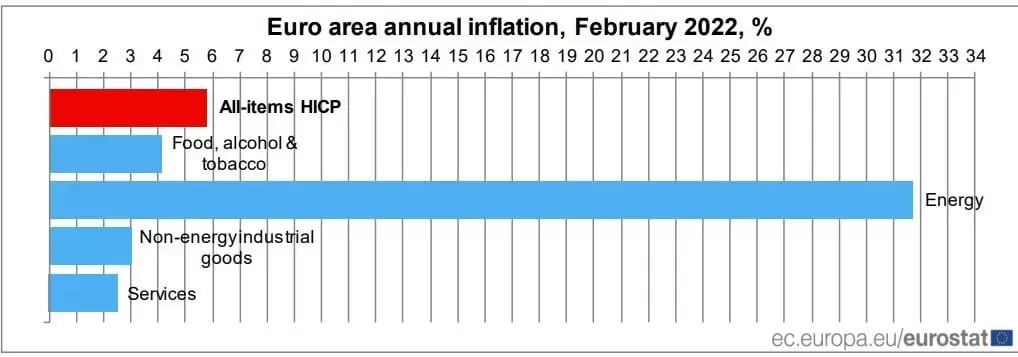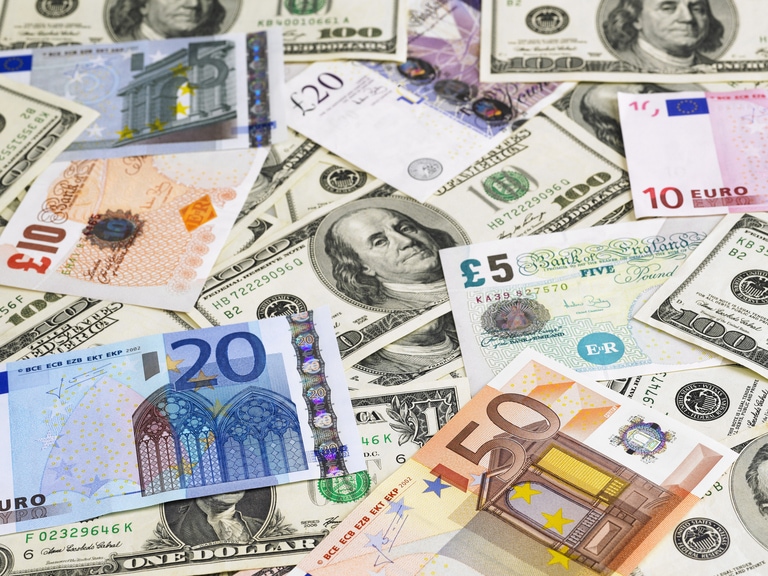Asia markets are expected to be under pressure this week amid concerns of economic stagflation due to soaring commodity prices caused by the Russia - Ukraine war, with the US Treasury yield curve flattening, pointing to a possible inversion, which indicates economic growth slows while inflation rises, eventually leading to a recession. China set its GDP target to 5.5% for 2022, indicating ongoing softening economic growth of the world's second-largest economy.
10-Year US Treasury Constant Maturity Minus 2-Year Treasury Constant Maturity

Source: Fred/Federal Reserve Bank of St. Louis
Key instruments to be watched
Commodities
Global commodity prices have been soaring due to tighter output, disruptions to the supply chain, and hedging activities. The price spikes could spill over to consumer prices in general and becomes a roadblock to economic growth.
Oil markets are still the focus for the coming week, with both WTI and Brent's futures prices heading to the US$120-mark. Investors are concerned sanctions on Russia might be extended to its oil exports, which could spike oil prices further and worsen global inflation issues.
Precious metals, including gold, silver, palladium, platinum, are classed as raw materials as well as safe-haven assets and are on the rise due to uncertainty.
In agriculture, the wheat prices jumped 30% since the war started. Wheat is a major export of Russia.
Stocks and Currencies
In general, both EU and US bank stocks get slashed due to their exposure to Russia’s bond markets, while energy outperforms with surging oil and gas prices.
EU stocks and Eurodollar suffered the most from the geopolitical tension, with Euro Stoxx 50 falling 20% from its February high and the Eurodollar down 5% against the US dollar.
Commodity currencies AUD and NZD strengthened, thanks to the rising export prices and relatively hawkish central bank policies.
The key economic data and events for the week ahead
US February CPI
The US Consumer Price Index is expected to increase by 7.9% YoY in February, higher than the previous data at 7.5%, indicating ongoing flaring inflation. Nonfarm payrolls rose 678,000 in February, well ahead of the 400,000 estimate. However, the worker's average hourly earnings growth was recorded at 0.0% vs 0.5% expected. Consumer affordability could become a serious issue to drag on economic growth.
ECB meeting
In the backdrop of a deteriorated economic outlook and possible surging inflation due to the Russia-Ukraine war, ECB faces a dilemma to decide on its monetary policy. The Eurozone CPI printed at a record high of 5.1% in January. Economists expected that the number could go higher to 5.8% in February due to the soring energy price and the single currency devaluation. But the central bank might hold back the plan to speed up tapering in highly uncertain times.

Source: Eurostat
Canada employment
Canada employment data is expected to keep improving in February. According to Thomson Reuters, there will be 160,000 new jobs added and the unemployment rate is to drop to 6.2% from 6.5% in January.
Europe’s Week Ahead
The Russian-Ukraine war is not only a humanitarian crisis but is also amplifying inflation concerns. Know more of what’s happening in Europe this week:
- Lockdown winner DocuSign’s fortunes look set to continue slowing.
- Revenue expected for Rivian Automotive looks pitiful for a company with around $60bn market share.
- Monthly expansion expected for UK GDP.






